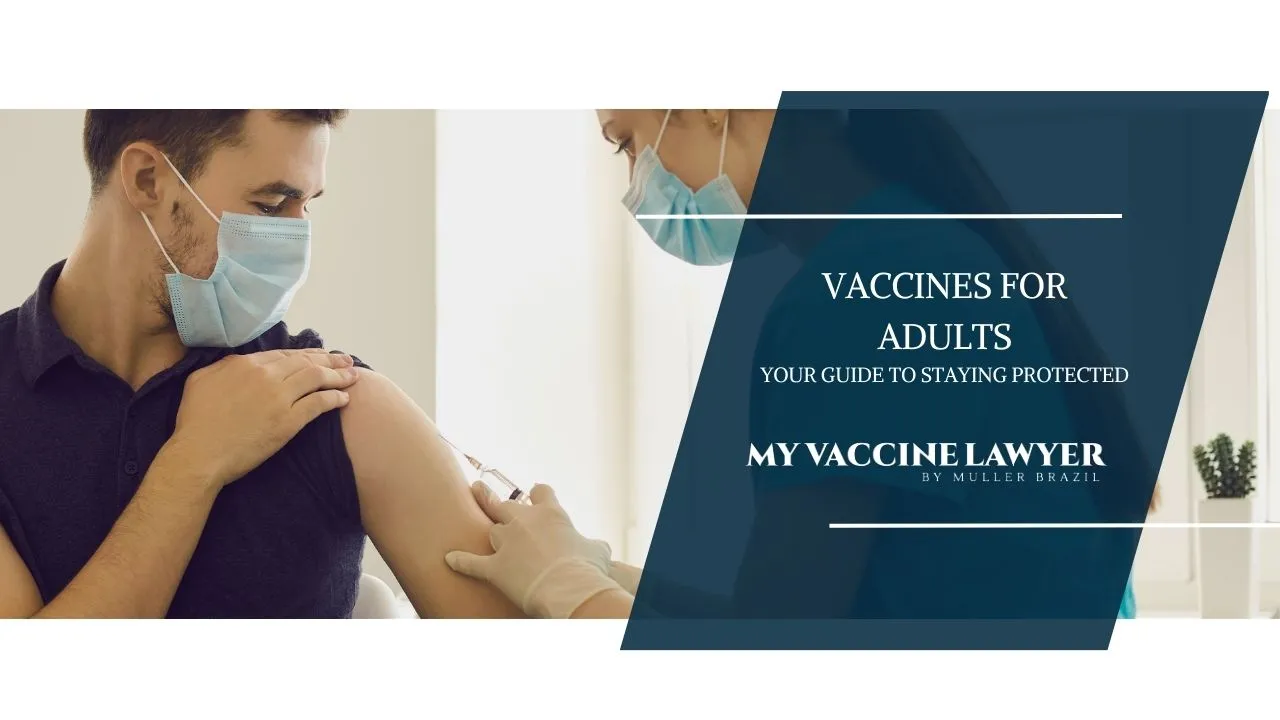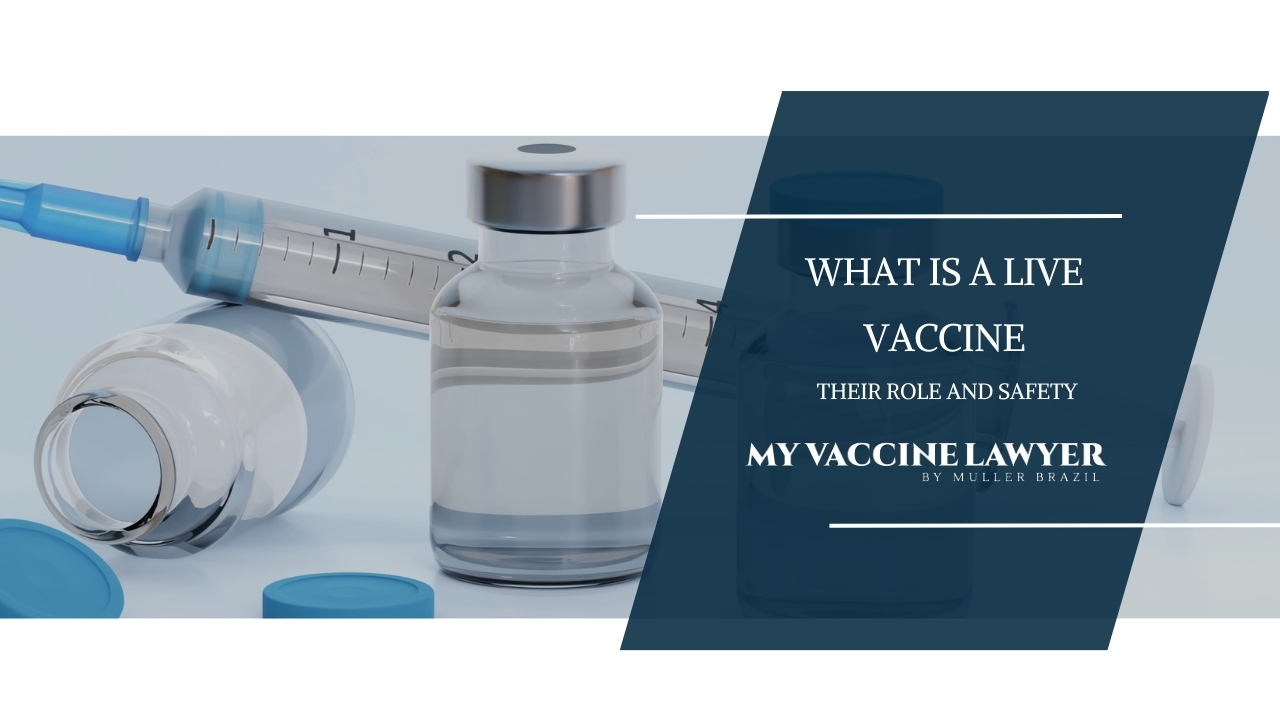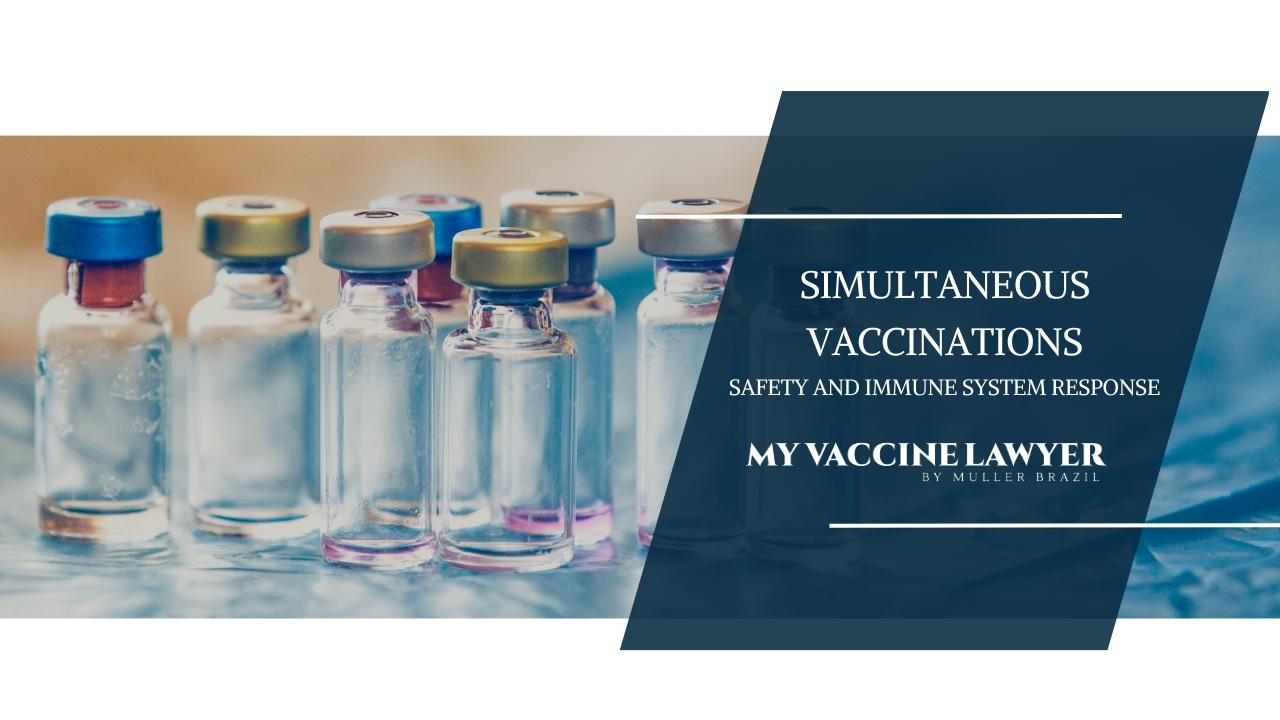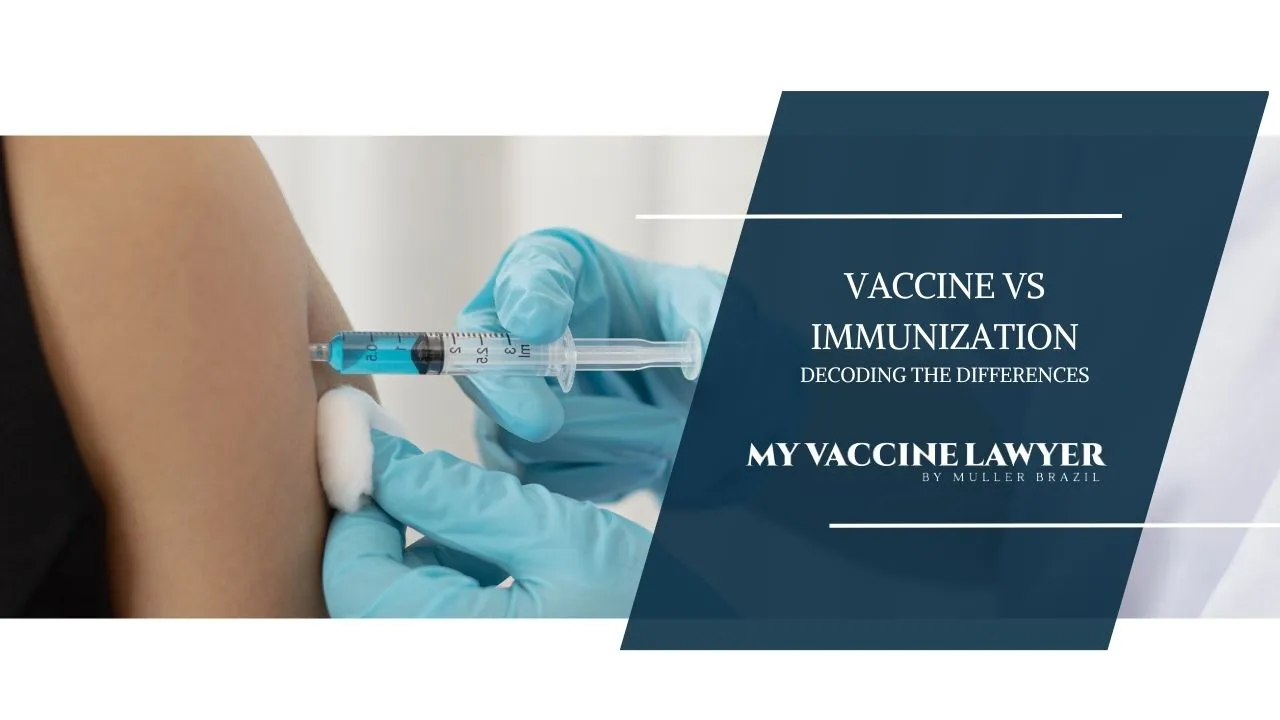Essential Adult Vaccines: A Comprehensive Protection Guide
Vaccines prevent more than 2.5 million deaths in the United States each year. Despite this staggering statistic, understanding adult vaccinations can...
8 min read
Vaccine Injury Law Resources / Vaccines / Vaccine vs. Immunization: Key Differences Explained
 Max Muller
:
Feb 22, 2024 1:55:00 PM
Max Muller
:
Feb 22, 2024 1:55:00 PM
Vaccines provide the blueprints for our immune systems to combat diseases effectively. Immunization, evidence of the success of these vaccines, is the fortress our bodies build, achieving resistance to diseases after vaccination.
Understanding the difference between vaccination and immunization is very important for your health. Vaccination introduces a vaccine to stimulate your immune system, while immunization is the process of developing resistance to a disease following vaccination. This distinction helps make informed health decisions and promotes immunity, protecting those unable to be vaccinated. Vaccines go through rigorous testing to secure safety and efficacy, very important for disease prevention and control.
Vaccines, biological preparations made from weakened or killed forms of bacteria or viruses or their genetic material, instruct the immune system to recognize and combat harmful organisms. This provides acquired immunity to specific diseases.
Vaccines introduce antigens into the body, stimulating the immune system to produce antibodies and memory cells for future responses. This helps prepare the body to fight off actual infections. Receiving a vaccine is typically through:
In contrast, immunization is the successful development of resistance to an infectious disease due to the vaccination process. While vaccination introduces the training module, immunization is the process where your body applies the lessons learned, developing immunity to a disease without experiencing the illness itself. The end goal of both processes is the same - a healthy, well-prepared immune system ready to defend the body against specific infections.
Vaccinations work by training the immune system to recognize and combat harmful pathogens and to create memory cells for a faster response if the pathogen is encountered again. This is crucial for disease control and prevention, as it equips the body with the necessary defense mechanisms to ward off serious illness.
There are different types of vaccines, each using specific forms or components of pathogens to trigger immunity. These include:
Each type has its own advantages and considerations, but all serve the same purpose: to train the immune system to swiftly and effectively respond to specific diseases.
Vaccination involves receiving a vaccine to stimulate the immune system, thereby protecting against infectious diseases. This act is key to disease control and prevention, as it not only protects the vaccinated individual from the disease but also contributes to herd immunity, shielding those who cannot be vaccinated.
Immunization, typically achieved through receiving a vaccine, is the process leading to a person’s immunity or resistance to an infectious disease. Once you get a shot, your body's defense system spots the vaccine as something it needs to fight off. It quickly gets to work using special cells that eat up germs and other cells that remember the germ, so it can't make you sick.
After you get a vaccine, your body starts to make special proteins called antibodies against the germs in the vaccine. These antibodies are like your body's own defense soldiers. The mRNA vaccines, which are a newer kind, also help train your body's cells to fight off the virus if you ever come across it for real. This whole process of teaching your body to defend itself against diseases you haven't actually caught is what we call immunization.
Immunization does not just benefit the individual; it also contributes to the health of the broader community. By reducing preventable diseases, immunization helps in disease control and prevention, protecting not just the vaccinated individuals but also those who cannot be vaccinated due to various reasons.
Vaccines contain various components, each playing a critical role in their effectiveness. The active ingredient in all vaccines is an antigen, designed to trigger the immune system to produce antibodies against a specific pathogen
These antigens can take the form of weakened or killed forms of viruses or bacteria, recombinant proteins, or genetic material that stimulates an immune response without causing the disease.
Apart from antigens, vaccines contain adjuvants like aluminum salts. These adjuvants help in creating a stronger immune response, maximizing the vaccine’s efficacy. Adjuvants help boost the body's defense against the injected antigens, making vaccines more effective with smaller amounts of antigen, which allows for the production of more vaccine doses.
By reducing the amount of antigen needed per dose through the use of adjuvants, more vaccine doses can be produced, helping to improve vaccine availability and distribution.
Post-vaccination immunity development is not immediate. It can take several weeks for the body to establish enough antibody defenses, particularly when multiple doses are necessary. For instance, live-attenuated vaccines, which mimic an infection and trigger the immune system to produce antibodies, often require fewer doses than non-live vaccines to reach maximum immunity.
Non-live vaccines typically need at least three doses to achieve sufficient protection, with certain vaccines providing lifetime immunity and others requiring boosters. For example, after receiving live vaccines like measles, mumps, and rubella (MMR), approximately 90-95% of recipients develop protective antibodies within two weeks, and the second dose improves the response rate to 97-99%.
The lasting power of immunity varies based on the vaccine type. While live-attenuated vaccines may offer lifelong protection, others, like the DTaP vaccine, require booster doses for continued defense against disease.
Herd immunity is important in the broader context of public health. Herd immunity is a form of indirect protection from infectious diseases that occurs when a large percentage of a population becomes immune to an infection, protecting those who are not immune.
It is the defense shield that protects communities, particularly those who cannot be vaccinated, such as newborns or individuals with weakened immune systems.
The herd immunity threshold varies from one disease to another, being higher for more contagious diseases, such as 95% for measles and 80% for polio. Achieving herd immunity through natural infection can lead to severe complications, so vaccination is the preferred method as it safely establishes immunity.
Immunization is key to reducing and eradicating diseases by promoting herd immunity. Vaccination protects individuals and fortifies communities, underlining our collective responsibility to protect public health.
The duration of immunity post-vaccination isn’t fixed; it varies based on the type of vaccine. Active immunity, such as that generated by vaccines, takes longer to develop but offers extended protection compared to passive immunity's immediate but temporary effect.
For instance, live-attenuated vaccines tend to provide longer-lasting immunity with fewer doses needed, while non-live vaccines usually require multiple doses and regular boosters.
Booster doses are often necessary as vaccine-induced immunity can decrease over time; these additional doses are vital for maintaining long-term immunity. It’s like a refresher course for your immune system, reminding it of the lessons it learned from the vaccine and making sure it remains ready to fight infections.
The immune system responds by continuing to refine its response to vaccines or natural infections for an extended period after initial exposure. This ongoing process of learning and adapting is what keeps our healthy immune system strong and ready to fend off disease-causing organisms.

Vaccines are crucial in shielding children from preventable diseases. They have reduced or eliminated diseases that previously killed or severely disabled children. The CDC’s approved vaccination schedule, influenced by vaccine recommendations from ACIP, reflects ongoing efforts to protect children against vaccine-preventable diseases.
The CDC provides an extensive immunization schedule for children up to 18 years, indicating the timing for most vaccines, such as:
This schedule is designed to maximize protection from birth. Following this schedule is key to guaranteeing children are protected when they are most susceptible to specific diseases, with priority for catch-up doses if any vaccines are missed.
For children with special health circumstances, like those who are immunocompromised or have a history of severe illness, the Centers for Disease Control provides specific timing and dosage recommendations to make sure they receive the necessary protection.
In a world where new diseases can emerge at any time, the CDC’s current vaccination schedule includes updated COVID-19 vaccination recommendations and the 3-dose Dengue vaccine series for specific at-risk populations. Many people often wonder how many doses are required for complete protection.
Vaccines undergo rigorous FDA approval, including Phase I, II, and III clinical trials. These trials evaluate, with increasingly more participants:
dose levels
immunogenicity
safety
efficacy over several years
Prior to human testing, vaccines are developed through extensive laboratory research, which can take 10-15 years, and animal studies in the proof of concept phase to evaluate immune response and effectiveness.
Following vaccine approval, systems like the Vaccine Adverse Event Reporting System (VAERS) and Vaccine Safety Datalink (VSD) are in place to monitor adverse events, and continuous surveillance by WHO and other regulatory authorities helps identify and reduce any potential safety issues.
Vaccine ingredients, including adjuvants, are thoroughly tested to ensure safety. The FDA's rigorous evaluation process during and after trials confirms that vaccines are safe and effective for everyone.
The World Health Organization (WHO) is a major player in global public health. COVID-19 vaccines have been crucial in global disease control, with estimates from the WHO stating that approximately 14.4 million lives were saved worldwide due to vaccination efforts in 2021.
The WHO estimates that around 70-90% of the population needs to be immune to effectively achieve herd immunity against the COVID-19 virus.
The WHO’s Strategic Advisory Group on Immunization (SAGE) has updated COVID-19 vaccination recommendations as of November 2023 to reflect the growing immunity in the population from both vaccination and infection. Furthermore, the WHO identifies and prioritizes pathogens, especially focusing on accelerating health solutions in low and middle-income countries.
The WHO's Product Development for Vaccines Advisory Committee (PDVAC) focuses on creating vaccines for diseases that could cause widespread illness or global health emergencies.
WHO’s Research and Development Blueprint strategically equips the global community for a rapid response during epidemics by focusing on research and developments concerning priority pathogens.
The overall statistics strongly suggest that vaccinations are beneficial, significantly contributing to public health and safety. However, recognizing the possibility of vaccine-related injuries is essential for a transparent and informed public health strategy.
For those who find themselves in the less fortunate position of suffering from a vaccine-related injury, there are legal options available. It is crucial for individuals to understand their rights and the avenues for recourse. One such pathway is through the National Vaccine Injury Compensation Program (VICP), which provides a no-fault alternative to the traditional legal system for resolving vaccine injury petitions.
Legal firms specializing in vaccine injury cases, such as My Vaccine Lawyer, offer services to manage the complexities of vaccine injury claims. We provide expertise in understanding the legal landscape, filing claims, and representing individuals in the Vaccine Court. Our role is to guarantee that clients receive fair representation and assistance in obtaining the compensation to which they may be entitled.
By understanding your legal rights and the support available, you can seek the justice and help you need. This support system underscores the commitment to not only promote the benefits of vaccines but also to care for those who have experienced the less common yet impactful adverse effects.
Vaccines are biological preparations that stimulate the immune system to fight diseases, while immunization is the body's development of resistance to disease following vaccination. With the goal of disease control and prevention, vaccines undergo rigorous testing for safety and efficacy.
Herd immunity, achieved through widespread vaccination, is important for protecting those unable to be immunized. Booster doses are sometimes necessary to maintain long-term immunity. Understanding these concepts is vital for informed health decisions and a healthier society.
Vaccines and immunization are powerful tools in disease prevention and control, serving as the linchpins of public health. As we continue to face new health challenges, understanding these concepts becomes even more crucial. So, let’s commit to spreading knowledge, not disease. Let’s champion vaccines and immunization, for our health and the health of our communities.
Vaccination is the act of introducing a vaccine into the body to produce protection from a specific disease, while immunization is the process of protecting against disease through vaccination. Therefore, vaccination is the specific action, whereas immunization is the broader process.
A booster shot increases existing immunity from a previous vaccination, while an updated vaccine protects against current variants.
The most commonly recommended vaccines include COVID-19, dengue, DTaP, Haemophilus influenzae type b, hepatitis A and B, human papillomavirus, and influenza vaccinations. This covers a wide range of immunization options.
Herd immunity is a form of indirect protection from infectious diseases that occurs when a large percentage of a population becomes immune to an infection, protecting those who are not immune. It is an important concept in public health.
The duration of immunity after vaccination varies depending on the type of vaccine. Some vaccines provide lifelong immunity, while others require booster doses for continued protection.
Mr. Muller currently devotes the majority of his law practice to aggressively fighting for the victims of unsafe drug and medical device injuries, as well as vaccine injuries and vaccine reactions involving the flu shot, TDaP/DTaP vaccine, and more. He has handled hundreds of SIRVA injury cases (shoulder injury related to vaccine administration), especially those involving bursitis, tendonitis, frozen shoulder, and rotator cuff tears. Mr. Muller also handles cases where vaccines caused serious nerve injuries such as Guillain-Barre Syndrome. Mr. Muller has recovered millions of dollars in compensation for his clients in the Vaccine Injury Compensation Program.

Vaccines prevent more than 2.5 million deaths in the United States each year. Despite this staggering statistic, understanding adult vaccinations can...

Live vaccines are important tools in preventing about 4 million deaths globally each year, as reported by the CDC. These vaccines use a weakened form...
 Read More
Read More
